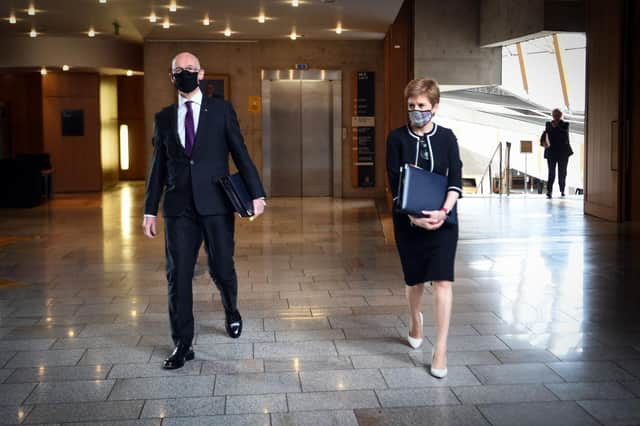Scotland's hospitality sector faces 'difficult' period, admits John Swinney


UK Hospitality executive director for Scotland Willie Macleod has already warned many businesses will not survive the new measures, with tens of thousands of job losses possible.
John Swinney insisted ministers had to act as coronavirus cases surge again, particularly in the Central Belt.
Advertisement
Hide AdAdvertisement
Hide AdIn five health board areas across central Scotland - Greater Glasgow and Clyde, Lanarkshire, Ayrshire and Arran, Lothian, and Forth Valley - temporary restrictions mean pubs and licenced restaurants will have to close from Friday and will only be permitted to operate takeaway services.
In all other areas, pubs, bars, restaurants and cafes can only operate indoors between 6am and 6pm, and will not be allowed to serve alcohol, although they can still sell drink until 10pm outside.
Mr Macleod said the impact on affected businesses "is going to be horrific".
He told BBC Breakfast: "Closing bars and restaurants is going to have a massive impact on businesses that are really just climbing back from a prolonged period of lockdown.
Advertisement
Hide AdAdvertisement
Hide Ad"They've reopened with reduced capacity to cope with social distancing, they were then hit by the 10pm curfew, and with reduced demand and reduced consumer confidence business resilience is as low as it can be.
"Many businesses won't survive and I'm afraid we're going to see tens of thousands of job losses by the time we do the final count on all of this."
The Scottish Chambers of Commerce has warned the measures - the toughest imposed in the UK - will "sound the death knell for businesses across the hospitality sector, especially pubs and bars".
And the Scottish Hospitality Group, which represents several restaurant and bar groups, claimed the First Minister has "effectively signed a death sentence for many businesses across the Scottish hospitality industry, while the real problem is socialising at home".
Advertisement
Hide AdAdvertisement
Hide AdThe Scottish Government has pledged £40 million of funds to help the sector through the restrictions, which will be in place from Friday until Sunday 25 October.
Mr Swinney said ministers had had to "dig deep" to find the extra cash to support the sector.
Speaking on BBC Radio Scotland's Good Morning Scotland programme, he said: "It is not extra resources we have had from the UK Government, we have had to dig deep into our own resources to find the money to support the hospitality sector through what I accept is going to be a difficult period for them.
"But we are doing that because we must take wider action to protect the public interests in these circumstances."
Advertisement
Hide AdAdvertisement
Hide AdHe said the Government has to "stop the opportunities for interaction where the virus can spread, that appears to be emerging from some aspects of the hospitality sector".
A Scottish Government evidence paper published on Wednesday shows that between the end of July and the beginning of October, more than a quarter (26 per cent) of those who tested positive for Covid-19 reported having been in hospitality.
Mr Swinney said: "I appreciate the challenges and difficulties faced by the hospitality sector, it is why the Government has put financial support in place."
Comment Guidelines
National World encourages reader discussion on our stories. User feedback, insights and back-and-forth exchanges add a rich layer of context to reporting. Please review our Community Guidelines before commenting.